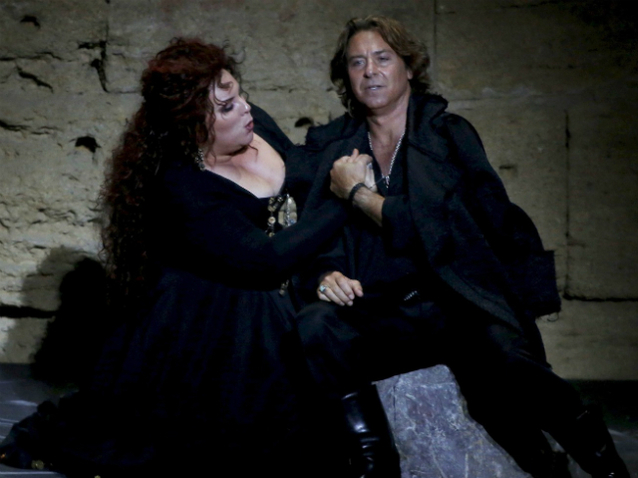 © Philippe Gromelle
© Philippe Gromelle
Giuseppe Verdi’s Il Trovatore is a legendary opera that returns often to the Chorégies d'Orange; older opera fans still remember the famous 1972 production featuring Montserrat Caballé at her zenith, the sonorous Lando Bartolini, the hair-raising Irina Arkhipova and thoroughbred Piero Cappuccilli in the principal roles. In 2015, the star for the evening is Roberto Alagna, who has appeared regularly on the stage of the Théâtre Antique since 1993, but who – just before the performance, via the social networks – announced to his fans that it would be his final appearance here, without offering any further explanations.
After a premiere – three days earlier – at which the tenor was not in his best form, that evening again he did not seem very involved in his role, as after the aria “Ah si ben mio”, one had the impression he was hurrying on to the following little duet, or thinking of something else entirely, perhaps to better focus on the fierce “Di quella Pira” that follows? While he attacked the famous aria with passion, it must be admitted that the final sharp was just barely achieved, and that he held it only a third as long as he did here in 2007. Let us acknowledge, then, that Roberto Alagna appeared uneven over the course of the performance, sometimes very good, as in the two duets with Azucena (especially the prison aria), the Miserere and the final duet, but sometimes in trouble, as in the Act II trio or, as we have just noted, in his big aria. In short, the heroic bravery that Manrico calls for does not seem to us suitable to his resources.
In her debut at Orange, Hui He delivers a beautiful interpretation of Leonora: her resources are impressive – those of a true lirico spinto; the timbre is rich and the delivery powerful, but the Chinese soprano nonetheless struggles to bend her voice to the pianissimi required of her role; she is particularly unmoving. Ultimately the lower voices left the best impression. Marie-Nicole Lemieux gives herself over completely to the immoderation of Azucena’s character by highlighting a robust timbre capable of shifting from shouting to a murmur with royal ease. As for George Petean,, he captivates us once again, this time in the role of Luna, thanks to his customary (and magnificent) vocal line, his superb projection, his noble and dignified timbre, all qualities that give his character extraordinary stature. He is undoubtedly the great verdian baritone of our time.
At the podium, French conductor Bertrand de Billy – heading up the Orchestre National de France in a smaller form – is hardly exciting. Accepting all the "customary" cuts as his own, he conducts with no empathy for the nocturnal and spirited aspects of the score. Managing to restore a bit of fire for a dazzling “Di quella pira”, he falls back into his routine during the final two scenes; his only merit is that he pays very close attention to the singers.
The (new) staging by the tradition-minded Charles Roubaud – he did a Trovatore here in 2007 (with Roberto Alagna) – relies heavily on the lovely video projections by Camille Lebourges (the vaulted cellars of a convent, a magnificently leafy forest, etc.), and the lighting by Jacques Rouveyrollis. In terms of direction of the actors, the Marseille stage director seems to have been concerned only with the title role, and Trovatore simply cannot be reduced to that single character, even when you have Roberto Alagna as Manrico.
Emmanuel Andrieu
Il Trovatore at the Chorégies d'Orange - The 4th of August 2015
the 12 of August, 2015 | Print

Comments